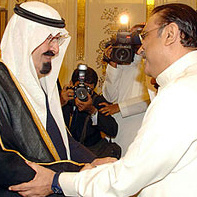Old Friends, Renewed friendships

.jpg) IRD:From North Africa to the Persian Gulf, the recent regional developments have deep implications –some latent- for bilateral and multilateral ties. Pakistan’s ties with Arab countries of the Persian Gulf region –particularly with Saudi Arabia- have not remained intact in the new political dynamics of Middle East.
IRD:From North Africa to the Persian Gulf, the recent regional developments have deep implications –some latent- for bilateral and multilateral ties. Pakistan’s ties with Arab countries of the Persian Gulf region –particularly with Saudi Arabia- have not remained intact in the new political dynamics of Middle East.A brief look at the history of Islamabad-Riyadh ties helps us gain a better understanding of the ongoing situation. For several reasons, the heyday of relations between the two countries was during the 1980s: there was the Iranian Islamic Revolution and its threatening implications for both Islamabad and Riyadh; the Soviet occupation of Afghanistan and concerns about the Communists’ approach toward the Indian Ocean and Persian Gulf waters, and the interplay of Pakistan’s economic needs and Saudi Arabia’s economic potential (several million Pakistanis are currently working in Arab countries of the Persian Gulf). The personal interests of Pakistan’s dictator at the time, General Zia-ul-Haq, also played a key role in fertilizing the ground for further cooperation.
Cooperation with Saudi Arabia was especially economically fruitful for Pakistan. Besides generous loans granted by Riyadh, money sent by Pakistani workers residing in Persian Gulf littoral states to their families was once roughly 25% of the country’s annual budget. The best symbol of these economic benefits is perhaps the burial site of Gen. Zia-ul-Haq: the grand Faisal Mosque, constructed with Saudi money in Islamabad.
State and non-state Saudi actors also encouraged the formation of radical Islamist groups in Pakistan who enjoyed special bonds with the Wahabbis of the Arabian Peninsula. Sipah-e-Sahaba, the poster child of terrorist groups established that decade, is residually still active inside and outside Pakistan. Saudis’ measures in Pakistan of course created sporadic tension in relations between Tehran and Islamabad.
It seems that as a result of current regional developments, these potentials are about to reactivate. Despite the serious turns in regional developments since the 1980s (Iran's political shifts, Afghanistan’s ups and downs, the Soviet Union’s dissolution, Zia-ul-Haq’s mysterious death, the return of Pakistan’s People Party (PPP) to power and the rise of Pervez Musharraf –who lacked Zia-ul-Haq’s religious image- to power) Saudi Arabia -along with China and the US- remains one of the key partners of Pakistan on the international stage. Islamabad is also regaining its previous position in Riyadh’s foreign policy.
Recently, shuttle trips between Saudi Arabia and Pakistan have increased; the latest visit made by Pakistan’s Acting FM, Hina Rabbani Khar, to Riyadh. Some analysts speculate that preserving the status quo in the region has been the basic topic of discussion between Ms. Khar and her Saudi friends. This is not fresh news. A few months ago, a remark made by Pakistani officials –then taken with a pinch of salt- was their readiness to extend security cooperation with the Persian Gulf littoral states.
Compared with the 1980s, there are three basic differences today: there is no Zia-ul-Haq with his hardline religious attitude, Pakistan’s economic state is, unfortunately, much worse than in the 1980s with the country more prone to Saudi Arabia’s sweeteners, and radical Islamist ideas have trickled down from Afghanistan toward northern Pakistan (and even toward its eastern province of Punjab and southern province of Sindh). Reactionary religious groups have gained mettle in Pakistan and can fill Zia-ul-Haq’s place, with the difference that unlike the 1980s’ dictator, they don’t appreciate the value of close ties with Iran.
Recent days have witnessed news of pro-Saudi Arabia demonstrations in Pakistan –either spontaneous or planned with bribes and favors. A segment of public opinion in Pakistan has the potential to support undemocratic Arab states and serve their foreign policy. This, along with news about Pakistan security forces recruited by Persian Gulf littoral states to suppress popular uprisings, will definitely offend Tehran.

